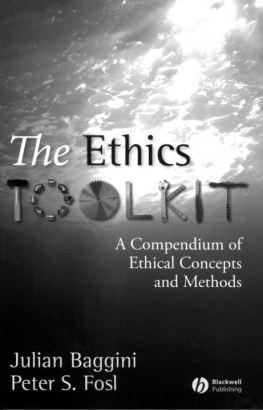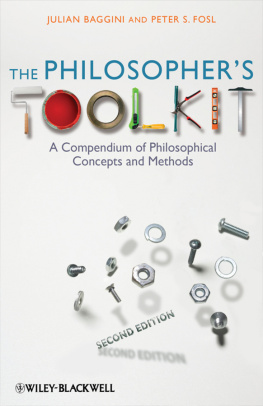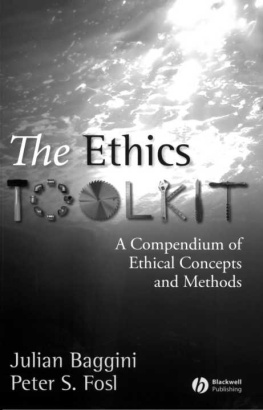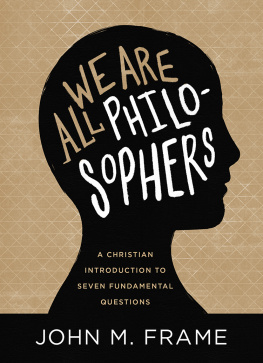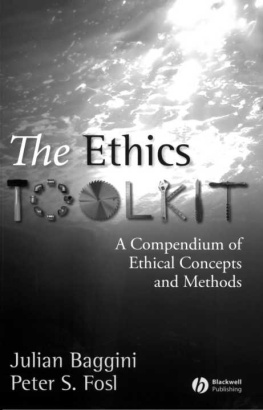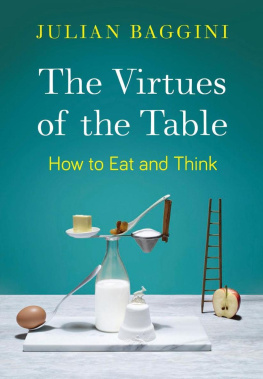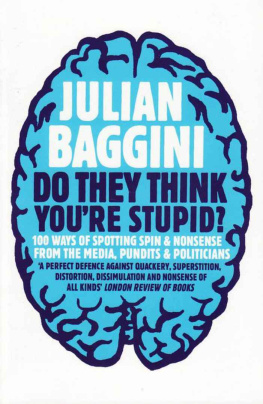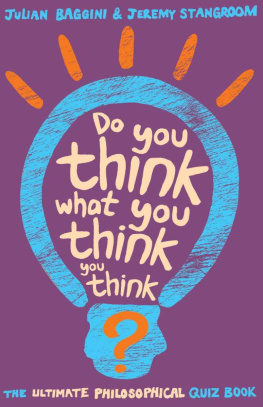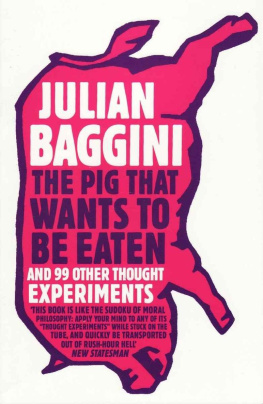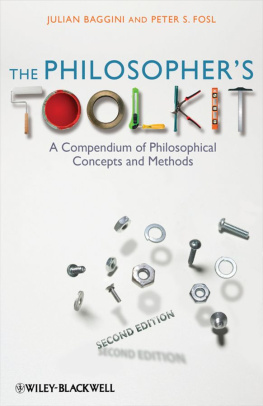JULIAN BAGGINI and JEREMY STANGROOM are the founding editors of The Philosophers Magazine . Julian Baggini writes regularly for the Guardian and is a frequent contributor to BBC Radio 4. His books include Whats It All About? Philosophy and the Meaning of Life and the bestselling The Pig That Wants to be Eaten (Granta Books). Jeremy Stangrooms books include The Little Book of Big Ideas: Philosophy (A&C Black) and What Scientists Think (Routledge).
Do You Think What You Think You Think?
The Ultimate Philosophical Handbook
JULIAN BAGGINI AND JEREMY STANGROOM

A PLUME BOOK
PLUME
Published by Penguin Group
Penguin Group (USA) Inc., 375 Hudson Street, New York, New York 10014, U.S.A. Penguin Group (Canada), 90 Eglinton Avenue East, Suite 700, Toronto, Ontario, Canada M4P 2Y3 (a division of Pearson Penguin Canada Inc.) Penguin Books Ltd., 80 Strand, London WC2R 0RL, England Penguin Ireland, 25 St. Stephens Green, Dublin 2, Ireland (a division of Penguin Books Ltd.) Penguin Group (Australia), 250 Camberwell Road, Camberwell, Victoria 3124, Australia (a division of Pearson Australia Group Pty. Ltd.) Penguin Books India Pvt. Ltd., 11 Community Centre, Panchsheel Park, New Delhi110 017, India Penguin Group (NZ), 67 Apollo Drive, Rosedale, North Shore 0745, Auckland, New Zealand (a division of Pearson New Zealand Ltd.) Penguin Books (South Africa) (Pty.) Ltd., 24 Sturdee Avenue, Rosebank, Johannesburg 2196, South Africa
Penguin Books Ltd., Registered Offices: 80 Strand, London WC2R 0RL, England
Copyright Julian Baggini and Jeremy Stangroom, 2006
Illustrations Katharine Reeve
All rights reserved
 | REGISTERED TRADEMARKMARCA REGISTRADA |
LIBRARY OF CONGRESS CATALOGING-IN-PUBLICATION DATA
Baggini, Julian.
Do you think what you think you think? : the ultimate philosophical handbook / Julian Baggini and Jeremy Stangroom.
p. cm.
ISBN: 978-1-1012-1348-3
1. PhilosophyMiscellanea. I. Stangroom, Jeremy. II. Title.
BD31. B28 2007
100dc22
2007003089
Without limiting the rights under copyright reserved above, no part of this publication may be reproduced, stored in or introduced into a retrieval system, or transmitted, in any form, or by any means (electronic, mechanical, photocopying, recording, or otherwise), without the prior written permission of both the copyright owner and the above publisher of this book.
PUBLISHERS NOTE
The scanning, uploading, and distribution of this book via the Internet or via any other means without the permission of the publisher is illegal and punishable by law. Please purchase only authorized electronic editions, and do no participate in or encourage electronic piracy of copyrighted materials. Your support of the authors rights is appreciated.
Acknowledgments
Thanks to George Miller and Gail Lynch for supporting the idea of this book; TPM Online (www.philosophersnet.com) mailing list members for beta testing many of the activities in their previous, online form; Ophelia Benson; and Sajidah Ahmad, Lesley Levene, Daphne Trotter, Joanna Macnamara for their thorough checking. Any mistakes that remain are entirely our responsibility.
The Philosophical Health Check is based on an original idea by Marilyn Mason.
So You Think Youre Logical? is inspired by original work by Peter Wason, Leda Cosmides and John Tooby.
The Do-It-Yourself Deity is based on an original idea by Jeremy Hayward and Gerald Jones, whose numerous books by Hodder Murray are strongly recommended, especially for teachers looking to introduce philosophical activities to the classroom.
Taboo is inspired largely by the work of Jonathan Haidt, Silvia Helena Koller and Maria G. Dias.
David Coopers Aesthetics: The Classic Readings (Blackwell) provided many of the sources for our summary of the major philosophical theories of art in Shakespeare vs. Britney Spears and is highly recommended for those wishing to find out more about them.
This book emerged out of our work with The Philosophers Magazine , which has only survived with the support of numerous generous contributors and individuals such as Ophelia Benson, Denis Collins, Jonathan Derbyshire, Susan Dwyer, Simon Eassom, Peter Fosl, Wendy Grossman, Mathew Iredale, Michael LaBossiere, Jeff Mason, Scott McLemee, Christopher Norris and Christian Perring; as well, of course, as our readers.
Introduction
Know thyself.
Inscription at the Temple of Apollo in Delphi
Theres no doubting that Descartes was a pretty clever guy. But whether it was his fault or that of his acolytes, a lot of hopeless misconceptions about human nature can be traced back to him. Of all these, perhaps the greatest is the incorrigibility of the mental: the belief that we cannot be mistaken about the contents of our own minds. I think I feel pain, so I do feel pain, and theres no way I can be mistaken about that. If I can see an elephant, then I may be hallucinating and there is no elephant there, but nonetheless, it has to be true that I am having the experience of seeing an elephant. If your coat looks yellow to me, the fact that it is really green doesnt change the fact that it looks yellow to me.
But the simple truth is that we can be horribly, tragically, painfully wrong about what is in our heads. Just think of the kinds of things people say all the time. I thought I was in love but really it was just lust. I thought I had indigestion but actually I was pregnant. I thought I believed in socialism but when I saw my tax bill I realized that I didnt. I thought I didnt want my children to be different but actually I wanted them to change so I could be closer to them. I thought I enjoyed working long hours but really I was kidding myself and I was just avoiding issues in my personal life. I thought I was being honest but actually I was holding back crucial information and deceiving him.
What we really think is an incredibly difficult area. The purpose of this book is to provide you with some entertaining ways of thinking about what and how you think, and to reveal some surprising things about both. By the end of it, we think you may well find yourself thinking that what you think you think is no longer what you thought you thought. And like that last sentence, that may be disconcerting, a little confusing, but actually quite good fun.
Visit this books Web site at www.doyouthinkwhatyouthink.com.
How to use this book
- Grab a pen or a pencil. A pencil is good for you , because it means you can always erase your answers and use the book again yourself, or pass it on to others. (A pen is good for us because you cant, so if you do enjoy it, youll have to buy more copies.)
- Dont be defensive. Be prepared to be wrong and also to argue back if you disagree with us. But not in e-mails, phone calls or heckles in public places, please.
- Go through each activity slowly and carefully. There is nothing so complicated that a bright child couldnt follow it, but if you rush or skip steps, youll end up more confused than an atheist finding himself at the pearly gates with Margaret Thatcher standing guard only letting in Orthodox Greeks.
- Dont worry about whether this book is serious or not. To do so is to worry about a bogus distinction. As Wittgenstein said, A serious and good philosophical work could be written consisting entirely of jokes. Or, in this case, games.


